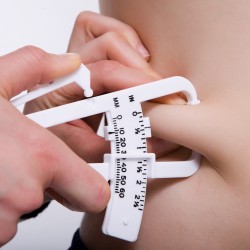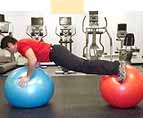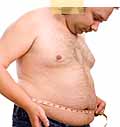Diagnose Your Bodyfat

5 Reasons You’re Not Losing Fat & How To Supercharge Fat Loss
There are 5 reasons you have bodyfat, so let’s break it down and get right to the point:
1.) You eat too much.
2.) You eat the wrong way.
3.) You’re not exercising.
4.) You’re not exercising the right way.
5.) You have a higher priority health issue going on in your body.
When push comes to shove, it all boils down to one or more of these 5 reasons. Instead of trying to solve all five at once, I’d recommend you tackle them in order. Without doing this, it’s an uphill battle you don’t deserve to fight.
Do you eat too much?
This isn’t about counting calories, necessarily, but that’s important. In general, you should be eating between 1,500 and 2,500 calories per day, depending on your body size and gender. The best metric for determining this is your BMR (basal metabolic rate.) Here’s the formula — figure out how much you should be eating and stick to it:
English BMR Formula
- Women: BMR = 655 + (4.35 x weight in pounds) + (4.7 x height in inches) – (4.7 x age in years)
- Men: BMR = 66 + (6.23 x weight in pounds) + (12.7 x height in inches) – (6.8 x age in years)
Metric BMR Formula
- Women: BMR = 655 + (9.6 x weight in kilos) + (1.8 x height in cm) – (4.7 x age in years)
- Men: BMR = 66 + (13.7 x weight in kilos) + (5 x height in cm) – (6.8 x age in years)
It’s important to note that lean body mass has a direct correlation to caloric consumption. In other words, if you are leaner, you should eat more calories, and you will be underestimating the caloric intake you should have. This really only applies to anyone who is less than 15% bodyfat. The contrary is also true (if you are obese, you need to eat less calories, because you don’t have muscle consuming the calories.)
Once you know your BMR, it’s time to associate this # of calories to your activity level and adjust accordingly. Your BMR is the number of calories your body will naturally burn throughout its day.
So, for example:
BMR = 1800 calories
This means that my body will naturally burn 1,800 calories every single day, without increasing my activity level. Therefore, in order to maintain my weight, I should consume 1,800 calories and I will not need to exercise beyond activities of daily living.
However, if you’d like to lose weight, you will have one of two choices:
- Eat less than 1,800 calories per day.
- Exercise more than your normal activities of daily living (includes parking your car far away and walking — this does not count.)
Important metric: One pound = 3,500 calories
So, if I want to lose 1 pound per week, I’ll need to create a caloric deficit of 3,500 calories over the course of the week, or 500 calories per day. This means that a mere 500 calories of exercise per day will accomplish my goal, so long as I don’t overeat on any one day.
When you exercise more, you’ll lose weight faster; when you eat less, you’ll also lose weight faster. The big question becomes: how much food can you sacrifice before you actually harm your metabolism?
Anything below about 1,300 calories (tiny frame, female) and 1,500 calories (tiny frame, male) will be dangerous for your metabolism. You’re simply not allowing your body the required energy to function, so it slows down and begins to migrate into a hibernation-like state. Your metabolism plummets, and so do your weight loss results. You may lose weight, but you’ll have a heck of a time keeping it off.
This is why increasing the amount of exercise is much smarter than caloric restriction. Eat at least your BMR and then exercise your bodyfat away.
Do you eat the wrong way?
Forget the food pyramid — sorry, but it’s crap. It’s meant well, but it’s misguided. I’ve seen example after example of a high fat, high protein, low carbohydrate diet winning for fat loss and overall health. In extreme cases, I’ve seen heart disease completely reversed in 90-180 days after a heart attack by modifying your diet to high fat, low carb. The reverse has equal potential to sabotage your health and damage the inside of your body. Many times, your bodyfat is an indication of the overall health of your body, on the inside.
When you see unwanted bodyfat, your body is trying to tell you something — you’re not as healthy as you should be. Weight is one consideration, but depositing fat is a red flag that something is wrong.
Get your bodyfat down, as follows, according to the American College of Sports Medicine (ACSM):
- Men – 10-20% bodyfat
- Women – 12-25% bodyfat
If you’re over 20% bodyfat as a man, or 25% bodyfat as a woman, you’re unhealthy.
Your blood work may be ok, and your doctor may be telling you that everything is fine, but your body is experiencing a downward spiral; it’s only a matter of time until it all comes crashing down. Get your bodyfat where it belongs, and then become concerned with your BMI (Body Mass Index.)
Body Mass Index Formula: [Weight (kg) / Height (meters squared)]
BMI over 25 is considered overweight. Over 30 is considered obese, and it gets worse from there, in increments of 5. (level II obesity, level III, etc.)
Yes, this matters for risk of cardiac disease, even if your bodyfat is low, because your heart is working too hard to pump blood to your body. But, the fact of the matter is that this affects about 1% of the population. The rest of us should be concerned with bodyfat %.
Let’s get back to eating the ‘right’ kinds of food. Here’s the scoop:
High fat diets produce sustained energy and they fill you — low fat diets destroy your energy levels and create massive carb cravings — protein feeds muscle, so if you’re building muscle to lose fat, you’re going to need protein to keep your results flowing.
A lot of people ask me about ‘carb crankiness’ and that’s an important question to answer. Consider the ‘quality’ of the food you’re eating, rather than just the macronutrient classification. Here are some simple rules to help you defend against carb crankiness:
- Make sure you are taking some sort of supplement (I take Athletic Greens for this) that will fulfill all of your micronutrient needs.
- Never eat trans-fats. The inflammation caused by trans fats and preservatives that are in your food are changing the way your body absorbs the nutrients you eat, and in all likelihood, you are getting a small percentage of caloric density from the food you chose wisely as a result of these compromised food choices.
- Remove sugar from your diet. Sounds hard, but that’s only because you are addicted. I hate sugar. There, I said it, and I’m just as addicted as you are. I hate it because it owns me, in some way, shape or form. It’s worse than the tobacco industry, in that sugar addiction reaches populations that tobacco never will. We’re trained to believe that sugar is a reward from a very young age, and we associate it with positivity and good behavior and experiences. You have to hate sugar for doing this to you, or you’ll never conquer it. Sugar is destroying your body, and you’re letting it happen, whether you mean to or not.
- Eat veggies for carbs, and stay away from more than 1-2 servings of fruit per day (better yet, once every few days.) Starchy foods, flour, and wheat all suck. They’re not meant for our bodies, and they are messing with our digestive systems in a totally uncool way.
- Avoid grains, soy, and corn. They mess with your hormones and affect your digestive tract in an ungodly way. That’s all I have to say about that.
Follow these 5 rules and you’ll easily transition into a healthy diet that ‘feels’ great and rewards you every day of your life with better health and longevity. Plus, you’ll shed fat ridiculously fast.
One important point here — only make this commitment for 3 weeks to start, and then re-evaluate. You’ll stand a much higher chance of success.
Do you exercise, regularly?
Be honest. Are you resistance training at least 2-3 days per week? If you’re not, there’s a huge gap in your fat loss and health journey that’s keeping you from success.
As human beings, we are extremely lucky to be able to exercise for as little as a few minutes per week and see our health progress. Historically, we needed to run and hunt for 8-12 hours per day, and that helped us maintain our health. Often times, we had to run on an empty stomach the whole time, alternating between ‘hiding and hunting’ and ‘sprinting for the kill.’ Today, we barely have to move and our health soars… It’s a small
commitment, but it’s a necessary one.
My preference is that you commit to 10 minutes of exercise 5 days per week, or 20 minutes 3 days per week. It’s simple, and you’ll see a tremendous difference.
Are you exercising correctly?
I discuss this in great detail on the post How To Get Lean In Less Than 1 Hour Per Week Without Dieting. As a summary of what works, here’s what I recommend:
- ‘Traditional Cardio’ (i.e. running, walking, swimming, etc. at a moderate and sustained pace for 40-60 minutes) has a lot of benefits, such as endorphin modification and regulation, stress relief, improved circulation, and oxygenation to muscles, ligaments, and other tissues.
- ‘Interval Training’ has a great fat-burning effect, but it’s tough on your body and it doesn’t build any muscle unless you incorporate resistance training to your interval-based workouts. You’ll need muscle to avoid plateau.
- ‘Resistance Training’ has great ‘muscle building’ and ‘muscular endurance’ benefits. When you do this while alternating high and low intensity work periods (i.e. metabolic resistance training), you’re able to create a massive fat-burning effect and progress your muscle to fat ratio, which will raise your BMI.
Is there a higher priority health issue that’s preventing fat loss?
There are several reasons that your body may be preventing you from losing fat, but they all boil down to the same principle — your body is trying to tell you something is wrong and it needs to be fixed.
I provide you with a screening tool that will help you determine which ‘higher priority’ system in your body may be preventing fat loss in Body Sequencing For Fat Loss.
With that in mind, there are a few common reasons that most people are not losing fat:
- Hormonal Abnormalities – in today’s society, hormones are out of control. This is a result of the hormones in our food, consumption of sugar, the stress of a two-person working family, ultraviolet lights in our office spaces, pollution, and other environmental stressors that cause up-regulation of cortisol, down-regulation of DHEA, or alterations in the levels of insulin and/or growth hormone. If your hormones aren’t normal, you’re going to have a heck of a time losing fat and getting healthy. Your body is responding differently than anyone can predict, and none of the above rules will create the response for which you’re hoping.
- Joint Pain – if your joints are screaming at you, they’re sending a signal to your brain to ‘turn off’ the signal to your muscles for them to contract. Re-align and stabilize your joints and watch your bodyfat disappear.
- Triglycerides – if your body is having a tough time breaking down carbs and utilizing them for energy, you’re depositing these carbs as fat. Again, eat veggies as your carb source for 3 weeks and enjoy a new level of fat loss.
- Heart Disease (or high risk of heart disease) – if your body thinks it’s about to suffer a cardiac event, it will help you avoid intense activity by making you tire out quickly and rest. Without hitting high intensities during exercise, it’s nearly impossible to sustain fat loss and improve your health. In this case, you have to build an exercise tolerance by working on Steady State Heart Rate Training (SSHRT) and progressing from low intensity (40% max heart rate) to high intensity (85% max heart rate and higher) over a period of weeks or months. Otherwise, you’ll immediately hit your ‘lactate threshold’ and you won’t be able to continue exercising.
- Digestive Issues – this is a communication issue between your two branches of your Autonomic Nervous System, your ‘parasympathetic’ (rest and digest) and your ‘sympathetic’ (fight or flight) systems. One easy suggestion that improves results rapidly is 60 seconds of diaphragmatic breathing anytime you go to the bathroom or you exercise. Your diaphragm is innervated by your parasympathetic nervous system, so you can actually calm this system by first purposely engaging it before you exercise.
By working on each of the 5 reasons you’re not losing fat that are listed above, in order, you are taking a comprehensive look at your fat loss and health obstacles that are preventing fat loss. Lose fat and improve your health. It’s your job, and it’s your body.
It’s time to motivate, with a plan that makes sense.
 Health and fitness results are difficult to achieve if you don't have a targeted as specific plan from the start. A properly guided exercise program involves goal setting...
Health and fitness results are difficult to achieve if you don't have a targeted as specific plan from the start. A properly guided exercise program involves goal setting...

 Your body is programmed to hold onto fat.
Your body is programmed to hold onto fat.